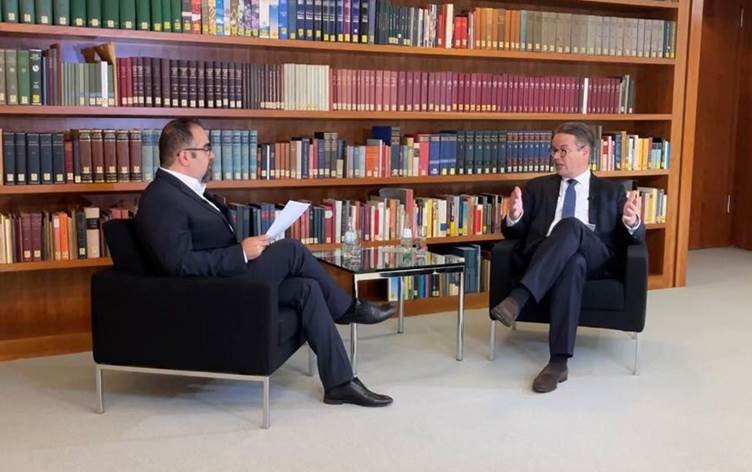BERLIN, Germany - Germany will conduct an evaluation of its troops in Iraq as Berlin’s mandate for its military mission in Iraq and the Kurdistan Region nears an end, a German official told Rudaw on Monday while emphasizing that there are “good reasons” to support the war-torn country and the Region.
“Over the summer we will do an evaluation of our deployment in Iraq. Where are our successes, where are our opportunities, what needs to be adapted. Then the government will make a proposal to the parliament, and the ultimate decision is with the parliament in autumn,” Minister of State at the Federal Foreign Office Tobias Lindner said of Germany’s possible extension of its military mandate in Iraq, adding that he is convinced that the former must continue to support Iraq and the Kurdistan Region.
Lindner reiterated his country’s support to the Kurdistan Region, under Chancellor Olaf Scholz’s leadership, saying “For sure you [the Region] can count on us,” adding that “the new German government will continue its support for the Kurdistan Region in Iraq, for sure, and also to Iraq as a whole.”
The German government decided on January 12 to end its military mission in Syria but keep up to 500 soldiers in Iraq until the end of October 2022. The government sent a motion to the parliament which voted in favor of the extension of troops mandate in Iraq.
Kurdish officials welcomed the step.
Addressing the current political impasse in Iraq, Lindner described October’s election as “the freest and most democratic” election in the history of Iraq. However, the country has failed to form a government eight months after the elections, which he said was the reason behind the non-stability in the country and Islamic State (ISIS) attacks in the disputed territories.
Iraqis took to the streets in October 2019 in massive protests against corruption and unemployment and called for the provision of basic services, leading to the death of around 600 protestors. The protests resulted in early elections, but the country's political future remains mired by instability with repeated government formation efforts failing.
The German minister stated that his country still sees ISIS as a threat to its national security. He added that the only way to overcome the ISIS activities in the disputed territories is “better cooperation between Erbil and Baghdad.”
Answering a question about the recent rocket attacks on Erbil and Kurdistan Region’s oil and gas infrastructure, the official said “we always condemn them. They are attacks on the stability of the whole region” adding “we are making pressure on those who are responsible for it.”
The Kurdistan Region has been facing an unprecedented number of rocket and drone attacks since the beginning of the year, mostly blamed on Iran-backed militias.
Iran attacked Erbil with twelve ballistic missiles in March, with at least four missiles landing on the residence of Kurdish oil tycoon Baz Karim Barzinji. The Islamic Revolutionary Guard Corps (IRGC) claimed responsibility for targeting "the strategic center of the Zionist conspiracy and evil by a point-to-point missile." Kurdish authorities vehemently rejected this accusation.
“All outlawed militias are threats… we want to have a strong Iraq with legitimate security forces and legitimate army. We do not want to have outlawed militias. That is our first goal. We know that the stability of Iraq is a key to the stability of the region and Europe,” he added.
“We remind the government of Iran of their responsibility for the region. If they support the outlawed militias, then is not good not only for Iraq but also for other neighboring countries,” noting that “every actor in the region, including Turkey must respect the international law and sovereignty of Iraq.”
On Turkish operations against the Kurdistan Workers’ Party (PKK) in Iraqi territories, Lindner said “We are concerned about the stability [of Kurdistan Region] and we expect Turkey to protect the civilians in the fight against terrorists, especially in any military operation.”
Ankara has received widespread criticism from Baghdad, Erbil, and the international community for violating Iraq's sovereignty. Its recent operation in Duhok province, dubbed Claw-Lock, has been condemned by Iraqi officials, who labeled it as a "hostile" and "provocative" violation of the country's sovereignty.
“On one hand we are aware of the security interests of Turkey, with regards to the PKK, which is recognized as a terrorist organization by Germany as well,” he said, adding “But let me be very clear, Turkish military operations against the PKK must always be in line with the international law.”








Comments
Rudaw moderates all comments submitted on our website. We welcome comments which are relevant to the article and encourage further discussion about the issues that matter to you. We also welcome constructive criticism about Rudaw.
To be approved for publication, however, your comments must meet our community guidelines.
We will not tolerate the following: profanity, threats, personal attacks, vulgarity, abuse (such as sexism, racism, homophobia or xenophobia), or commercial or personal promotion.
Comments that do not meet our guidelines will be rejected. Comments are not edited – they are either approved or rejected.
Post a comment